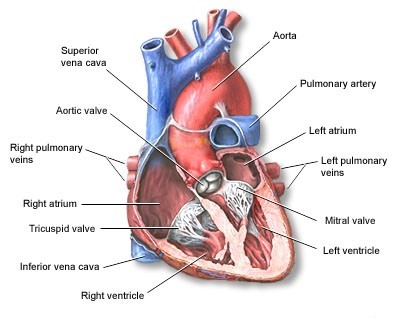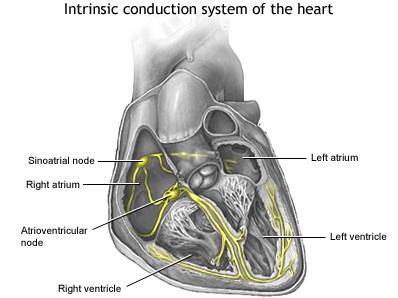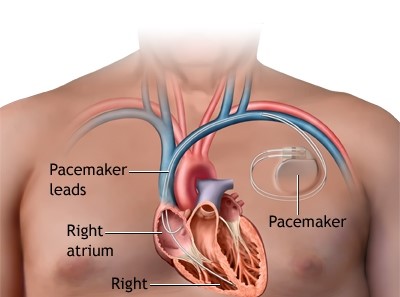Arrhythmias
Contents
When to Contact a Medical Professional
An arrhythmia is a disorder of the heart rate (pulse) or heart rhythm. The heart can beat too fast (tachycardia), too slow (bradycardia), or irregularly.

Causes
Normally, your heart works as a pump that brings blood to the lungs and the rest of the body.
To help this happen, your heart has an electrical system that makes sure it contracts (squeezes) in an orderly way.
- The electrical impulse that signals your heart to contract begins in the sinoatrial node (also called the sinus node or SA node). This is your heart's natural pacemaker.
- The signal leaves the SA node and travels through the heart along a set electrical pathway.
- Different nerve messages signal your heart to beat slower or faster.
Arrhythmias are caused by problems with the heart's electrical conduction system.
- Abnormal (extra) signals may occur.
- Electrical signals may be blocked or slowed.
- Electrical signals travel in new or different pathways through the heart.
Some common causes of abnormal heartbeats are:
- Abnormal levels of potassium or other substances in the body
- HEART ATTACKor a damaged heart muscle from a past heart attack
- Heart disease that is present at birth (congenital)
- Heart failure or an enlarged heart
- Overactive thyroid gland

Arrhythmias may also be caused by some substances or drugs, including:
- Alcohol, caffeine, or stimulant drugs
- Heart or blood pressure medicines
- Cigarette smoking (nicotine)
- Drugs that mimic the activity of your nervous system
- Medicines used for depression or psychosis
Sometimes medicines used to treat one type of arrhythmia will cause another type of abnormal heart rhythm.
Some of the more common abnormal heart rhythms are:
- Atrial fibrillation or flutter
- Atrioventricular nodal reentry tachycardia (AVNRT)
- Heart block or atrioventricular block
- Multifocal atrial tachycardia
- Paroxysmal supraventricular tachycardia
- Sick sinus syndrome
- Ventricular fibrillation or ventricular tachycardia
- Wolff-Parkinson-White syndrome
When you have an arrhythmia, your heartbeat may be:
- Too slow (bradycardia)
- Too quick (tachycardia)
- Irregular, uneven, or skipping beats
An arrhythmia may be present all of the time or it may come and go. You may or may not feel symptoms when the arrhythmia is present. Or, you may only notice symptoms when you are more active.
Symptoms can be very mild, or they may be severe or even life-threatening.
Common symptoms that may occur when the arrhythmia is present include:
- Chest pain
- Fainting
- Light-headedness, dizziness
- Paleness
- Shortness of breath
- Sweating
Exams and Tests
The doctor will listen to your heart with a stethoscope and feel your pulse. Your blood pressure may be low or normal.
Heart monitoring devices are often used to identify the rhythm problem, such as a:
- Holter monitor (used for 24 hours)
- Event monitor or loop recorder (worn for 2 weeks or longer)
Other tests may be done to look at heart function:
- Coronary angiography
- ECG (electrocardiogram)
- Echocardiogram
A special test, called an electrophysiology study (EPS), is done to take a closer look at the heart's electrical system.
Treatment
When an arrhythmia is serious, you may need urgent treatment to restore a normal rhythm. This may include:
- Electrical "shock" therapy (defibrillation or cardioversion)
- Implanting a short-term heart pacemaker
- Medicines given through a vein (intravenous) or by mouth
Sometimes, better treatment for your angina or heart failure will lower your chance of having an arrhythmia.
Medicines called anti-arrhythmic drugs may be used:
- To prevent an arrhythmia from happening again
- To keep your heart rate from becoming too fast or too slow
Some of these medicines can have side effects. Take them as prescribed by your health care provider. Do not stop taking the medicine or change the dose without first talking to your health care provider.
Other treatments to prevent or treat abnormal heart rhythms include:
- Cardiac ablation, used to destroy areas in your heart that may be causing your heart rhythm problems
- An implantable cardiac defibrillator, placed in people who are at high risk of sudden cardiac death
- Pacemaker, a device that senses when your heart is beating irregularly, too slowly, or too fast. It sends a signal to your heart that makes your heart beat at the correct pace.

Outlook (Prognosis)
The outcome depends on several factors:
- The kind of arrhythmia you have. (Some abnormal heart rhythms may be life threatening if not treated right away, or do not respond well to treatment.)
- Whether you have coronary artery disease, heart failure, or valvular heart disease
When to Contact a Medical Professional
Call your health care provider if:
- You develop any of the symptoms of a possible arrhythmia.
- You have been diagnosed with an arrhythmia and your symptoms worsen or do not improve with treatment.
Prevention
Taking steps to prevent coronary artery disease may reduce your chance of developing an arrhythmia.

